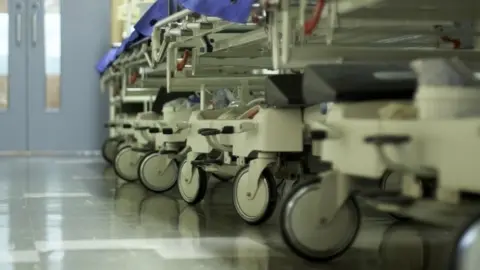Health and social worker pay talks with department end
 Getty Images
Getty ImagesPay talks have ended between health worker unions and the Department of Health.
Trade unions issued a statement outlining the "failure to recommence meaningful talks".
The Department of Health said it is disappointed the pay talks ended and that industrial action is looming.
The first phase of industrial action will run from 25 November till 18 December and phase two will run to March 2020.
Nurses in Northern Ireland are due to strike next month over staffing numbers and pay disputes - and Unison workers are to start industrial action on Monday. Unite members ballot on industrial action is due to close next week.
Unison, which represents health workers, said members across the entire health and social services system will take part.
The industrial action will also include:
- Not working overtime
- Not working unpaid hours
- Not completing paperwork other than individual patient records
Formal pay offer
The Department of Health said its formal pay offer, which it made earlier this week, represents a 2.1% increase to the pay bill for Agenda for Change, the framework covering most of the Northern Ireland health and social Care workforce.
The offer includes:
- All pay increases to be backdated to April 2019;
- Eligible staff would also get pay progression increases to move them towards the top of their respective pay bands;
- Pay progression adds in the region of 1% to the pay bill, on the top of any annual pay increase.
The Department has also proposed an independently facilitated process to agree on a detailed and fully costed programme of proposed measures to resolve pay issues and workforce pressures within five years, for consideration by incoming ministers.
But the unions said this pay offer was rejected last week.
"There was nothing new from the Department and Employers on this issue," they wrote in a statement.
 Getty Images
Getty Images"What has been proposed would see the gap in pay widening between our staff and colleagues in the rest of the UK.
"This will not only impact now on pay levels but will have a detrimental impact on future pay and pensions."
Richard Pengelly, permanent secretary of the Department of Health, said: "We have worked hard with trade unions to make progress in very difficult circumstances.
"While I would have preferred to be in a position to make a higher pay offer, this is the best we can afford given the budgetary constraints and limited authority in the absence of a minister.
"Of course, a returning Minister would be able to revisit this issue, with the greater ability to address the affordability constraint. Suspending industrial action and participating in the process we have suggested would not prevent that from happening."
Speaking in response to the statement released by the Department of Health, Pat Cullen, Director of the Royal College of Nursing (RCN) in Northern Ireland said: "We are aghast that the Department of Health still does not appear to take seriously the issues facing nursing staff in Northern Ireland and, in comparison to figures presented to the trade unions earlier this year, there appears to be even less in the budget now.
"Our members will be extremely angry to learn this information. This only affirms the decision that RCN members have made in relation to taking industrial action and strike action over the coming weeks."
